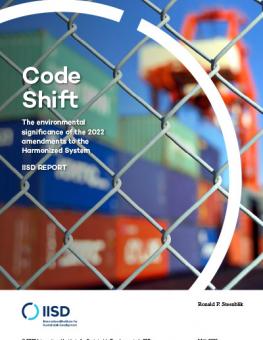
Code Shift: The environmental significance of the 2022 amendments to the Harmonized System
This report explains how recent amendments to the harmonized coding system used to track international merchandise trade will help improve the monitoring of trade in both environmentally sensitive products and environmental goods.
Key Messages
- The World Customs Organization recently released amendments to the Harmonized Commodity Description and Coding System (HS)—essentially, the language of trade. These changes will be implemented by most of the world’s economies on January 1, 2022.
- Many of the changes will facilitate the monitoring of exports and imports of environmentally sensitive products, such as electronic wastes, but also trade in environmental goods, such as solar photovoltaic panels and mass spectrometers.
- This update is a considerable improvement, but the next version of the HS, to be released in 2027, could be further enhanced by creating specific, harmonized codes for a number of goods that will be increasingly important for dealing with the world’s pressing environmental problems.
This paper highlights the environmental significance of recent changes to the Harmonized Commodity Description and Coding System (HS), approved by members of the World Customs Organization in early 2020. These changes, which will go into effect at the beginning of 2022, facilitate the monitoring of trade in both environmentally sensitive products and “environmental goods”— that is, goods that serve an environmental purpose. Notably, this includes new commodity codes specific to several technologies that use solar energy and energy-efficient light-emitting diodes. The brief concludes by discussing a number of goods for which greater specification in the HS would facilitate the negotiation of trade agreements aimed at environmental goods and trade statistics collected on those goods. These insights are highly relevant to specialists working on trade or environmental policy, as well as customs authorities.
You might also be interested in
Agreement on Climate Change, Trade and Sustainability: A landmark pact for trade and sustainability
The ACCTS pact, signed by Costa Rica, Iceland, New Zealand, and Switzerland, aligns trade and environmental policies, tackling fossil fuel subsidies, eco-labels, and green trade.
Addressing Carbon Leakage: A toolkit
As countries adopt ambitious climate policies, this toolkit examines strategies to prevent carbon leakage—when production and emissions shift to nations with weaker climate policies—and explores the trade-offs of each approach.
IISD Trade and Sustainability Review, December 2024
This edition of the IISD Trade and Sustainability Review presents four expert perspectives on how agricultural support and subsidies can promote sustainability in developing and least developed countries.
Why Trade Matters in the Plastic–Pollution Treaty Negotiations
The global push to end plastic pollution by 2040 highlights the critical intersection of trade and environmental action, with upcoming INC-5 negotiations focusing on reducing plastic production, consumption, and waste within a fair and effective international framework.